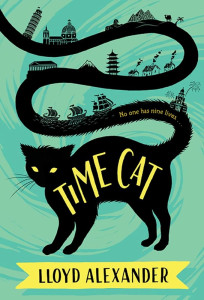 Jason’s in trouble. He’s been sent to his room for, among other things, spilling paint on the dining room table, punching his younger brother for laughing at him, and talking back to his mother. Sulking in his room, he turns to his black cat Gareth for comfort:
Jason’s in trouble. He’s been sent to his room for, among other things, spilling paint on the dining room table, punching his younger brother for laughing at him, and talking back to his mother. Sulking in his room, he turns to his black cat Gareth for comfort:
” ‘Lucky Gareth,’ he sighed . . . ‘I wish I had nine lives.’
The cat stopped purring. ‘I wish I did, too,’ he said.”
Gareth reveals that the popular belief is a misconception — cats don’t have nine lives, but they can visit nine lives, once each. Gareth hasn’t used that special option just yet — he was waiting for something — well, special. Jason immediately begs him to take him on the nine-lives journey, and Gareth agrees, warning him not to allow them to get separated “…for any length of time. Otherwise, you’d never see home again.” Jason eagerly agrees, and they’re off.
The duo starts in Egypt, 2700 B.C., where cats are considered sacred. Unfortunately, a deceitful Chief Scribe, spotting Gareth’s unusual markings — a white splotch in the shape on an anhk on his chest — decides the cat must be given to the current Pharaoh, Neter-Khet. He tricks Jason into coming to the palace, takes Gareth away, and throws the boy in a cell. The dire situation turns to a good ending, with Pharaoh declaring ” ‘[N]either [Gareth] nor any cat who shall live in the Great House shall be called a possession. Pharaoh is not his master, but his host and privileged friend.’ ” He gives Jason a golden anhk as a reward, and the two are off on another adventure.
The other stories are similar; Jason and Gareth go to Rome and Britain, Ireland, Japan, Italy, Peru, the Isle of Man, Germany, and America, moving further up the timeline each jump until they arrive back home. Each time, they teach and inspire people by their example; Leonardo da Vinci gets to go to art school instead of becoming a notary, Don Diego turns from being an army captain to being the lexicographer he’s always wanted to be. ” ‘Because I know I’m a cat,’ Gareth said, ‘Don Diego’s just found out he’s a man.’ ”
By the end of the book, Jason has learned a great deal as well — about others, and about himself. This is a nice collection of children’s stories laced with Lloyd Alexander’s usual simple language, wry humor, and deliberate pacing. There’s a moral lesson in each step of the journey, not so prominent as to overwhelm but present if you look for it. I would definitely recommend this to children and adult children.
(Holt, 1963; Puffin Books, 2004)
